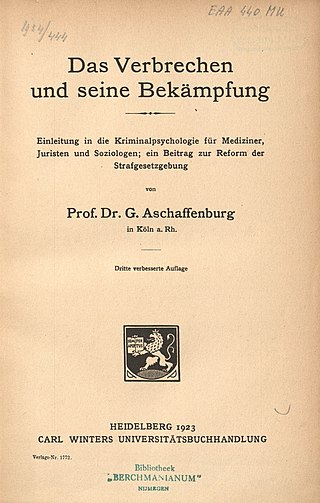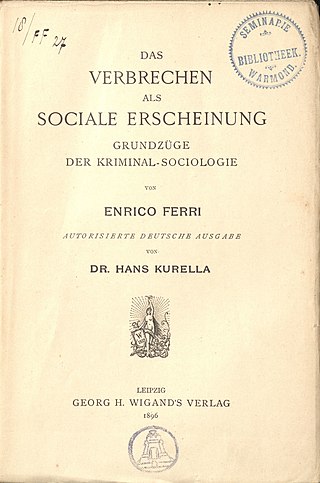
Criminal justice is the delivery of justice to those who have been accused of committing crimes. The criminal justice system is a series of government agencies and institutions. Goals include the rehabilitation of offenders, preventing other crimes, and moral support for victims. The primary institutions of the criminal justice system are the police, prosecution and defense lawyers, the courts and the prisons system.

Cesare Lombroso was an Italian eugenicist, criminologist, phrenologist, physician, and founder of the Italian school of criminology. He is considered the founder of modern criminal anthropology by changing the Western notions of individual responsibility.
Matthew Barnett Robinson is a Criminologist at Appalachian State University (ASU) in Boone, North Carolina.

The Institute of Criminology is the criminological research institute within the Faculty of Law at the University of Cambridge. The Institute is one of the oldest criminological research institutes in Europe, and has exerted a strong influence on the development of criminology. Its multidisciplinary teaching and research staff are recruited from the disciplines of law, psychiatry, psychology, and sociology. It is located on the Sidgwick Site in the west of Cambridge, England. The Institute of Criminology building was designed by Allies and Morrison. The Institute is also home to the Radzinowicz Library, which houses the most comprehensive criminology collection in the United Kingdom. The Institute has approximately 50 PhD students, 30-40 M.Phil. students, and 200 M.St students. The Institute also offers courses to Cambridge undergraduates, particularly in law, but also in human social and political sciences and in psychology and behavioural sciences.
Stuart Henry is professor emeritus, Criminal justice and former director of the School of Public Affairs, San Diego State University (2006–17). He has also been visiting professor of criminology at the University of Kent's School of Social Policy, Sociology and Social Research from 2008 to 2013 and visiting research scholar in sociology at the University of Hawaii, Manoa, 2017.
Jock Young was a British sociologist and an influential criminologist.
Jonathan Simon is an American academic, the Lance Robbins Professor of Criminal Justice Law, and the former Associate Dean of the Jurisprudence and Social Policy Program at the UC Berkeley School of Law. Simon’s scholarship concerns the role of crime and criminal justice in governing contemporary societies, risk and the law, and the history of the interdisciplinary study of law. His other interests include criminology; penology; sociology; insurance models of governing risk; governance; the origins and consequences of, and solutions to, the California prison "crisis"; parole; prisons; capital punishment; immigration detention; and the warehousing of incarcerated people.
Nicole Hahn Rafter was a feminist criminology professor at Northeastern University. She received her Bachelor of Arts degree from Swarthmore College in Pennsylvania, achieved her Master of Arts in Teaching from Harvard University, and obtained a Ph.D. in Criminal Justice from State University of New York in Albany. She began her career as a high school and college English professor and switched to criminal justice in her mid-thirties.
The Stockholm Prize in Criminology is an international prize in the field of criminology, established under the aegis of the Swedish Ministry of Justice. It has a permanent endowment in the trust of the Stockholm Prize in Criminology Foundation. The Stockholm Prize in Criminology is a distinguished part of the Stockholm Criminology Symposium, an annual event taking place during three days in June.

Criminology is the interdisciplinary study of crime and deviant behaviour. Criminology is a multidisciplinary field in both the behavioural and social sciences, which draws primarily upon the research of sociologists, political scientists, economists, legal sociologists, psychologists, philosophers, psychiatrists, social workers, biologists, social anthropologists, scholars of law and jurisprudence, as well as the processes that define administration of justice and the criminal justice system.
David L. Weisburd, is an Israeli/American criminologist who is well known for his research on crime and place, policing and white collar crime. Weisburd was the 2010 recipient of the prestigious Stockholm Prize in Criminology, and was awarded the Israel Prize in Social Work and Criminological Research in 2015, considered the state's highest honor. Weisburd is Distinguished Professor of Criminology, Law and Society at George Mason University. and Walter E. Meyer Professor Emeritus of Law and Criminal Justice in the Institute of Criminology of the Hebrew University Faculty of Law. At George Mason University, Weisburd was founder of the Center for Evidence-Based Crime Policy and is now its Executive Director. Weisburd also serves as Chief Science Advisor at the National Policing Institute in Washington, D.C. Weisburd was the founding editor of the Journal of Experimental Criminology, and is editor of the Cambridge Elements in Criminology Series.
Walter Reckless was an American criminologist known for his containment theory.
The Academy of Criminal Justice Sciences (ACJS) is an international association established in 1963 to foster professional and scholarly activities in the field of criminal justice and criminology. ACJS promotes criminal justice and criminology education, policy analysis, and research for scholars, practitioners, and policymakers. Its national office is located in Greenbelt, Maryland, a suburb of Washington, D.C., in the US.
Joan Ramme Petersilia was an American criminologist and the Adelbert H. Sweet Professor of Law at Stanford Law School, as well as the faculty co-director of the Stanford Criminal Justice Center.
Anthony Walsh is an American criminologist and professor emeritus at Boise State University in Boise, Idaho. He was educated at Eastern Michigan University, the University of Toledo, and Bowling Green State University. He worked in law enforcement for 21 years before joining the faculty of Boise State University in 1984. These positions included a stint as a probation officer in Lucas County, Ohio.

Public criminology is an approach to criminology that disseminates criminological research beyond academia to broader audiences, such as criminal justice practitioners and the general public. Public criminology is closely tied with “public sociology”, and draws on a long line of intellectuals engaging in public interventions related to crime and justice. Some forms of public criminology are conducted through methods such as classroom education, academic conferences, public lectures, “news-making criminology”, government hearings, newspapers, radio and television broadcasting and press releases. Advocates of public criminology argue that the energies of criminologists should be directed towards "conducting and disseminating research on crime, law, and deviance in dialogue with affected communities." Public criminologists focus on reshaping the image of the criminal and work with communities to find answers to pressing questions. Proponents of public criminology see it as potentially narrowing "the yawning gap between public perceptions and the best available scientific evidence on issues of public concern", a problem they see as especially pertinent to matters of crime and punishment.

Crime and its repression is a book that was originally published in 1903 and written by Gustav Aschaffenburg. It was translated to English in 1913. It investigates the underlying causes of crime and advises on different methods of punishment and deterrence. It was highly influential in the domain of criminal psychology and widely used as educational literature among universities for decades after its publication.

Das Verbrechen als soziale Erscheinung; Grundzüge der Kriminal-Sociologie was written by Enrico Ferri and originally published in 1884, but has undergone several revisions since then. It deals with Ferri's perspective on criminal sociology and problems of penology. The book is known as Ferri's most important work and represents the positive school of criminology.

Gregg Barak is an American criminologist, academic, and author. He is an emeritus professor of criminology and criminal justice at Eastern Michigan University, a former visiting distinguished professor in the College of Justice & Safety at Eastern Kentucky University, and a 2017 Fulbright Scholar in residence at the School of Law, Pontificia Universidade Catholica, Porto Alegre, Brazil. He is most known for his research in the fields of criminology and criminal justice.
James E. Hawdon is an American sociologist, academic, and author. He is a professor of Sociology and a Director for the Center for Peace Studies and Violence Prevention at Virginia Tech.







